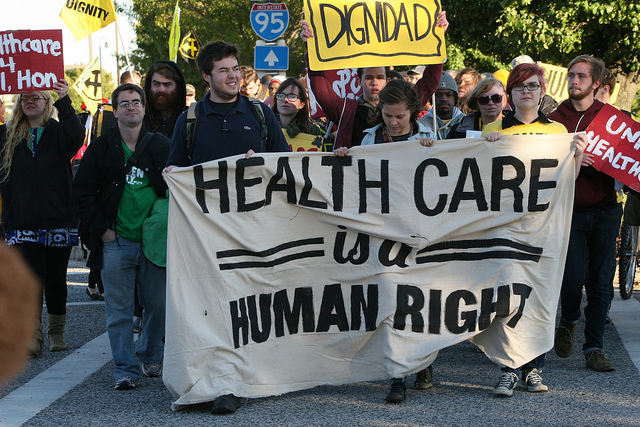By Aditya Krishnaswamy
In 2016, conservatives led their siege on Capitol Hill with the mantra of “repeal and replace,” promising to dismantle the Affordable Care Act (ACA) as soon as they took power. While not completely undone, severe blows have been dealt to President Obama’s principal legislation, angering the Democratic Party. There is no debating the importance of healthcare in today’s politics; this election cycle is no different.
As November approaches, the left is seizing the opportunity to scrutinize the federal government’s recent actions. Take Aftab Pureval, Democratic US House candidate for Ohio’s First District, who aimed the barrel right at Republican incumbent Steve Chabot by claiming that Chabot “voted to sabotage [constituents’] health care,” citing a May 2018 Center for American Progress report that families in his district would soon experience increased health care premium costs of $800 dollars each.
Democrats across the country are similarly claiming that the actions of the GOP-led Congress and the Trump administration have sabotaged healthcare. Another Democratic House candidate, Ryan Watts, of North Carolina’s Sixth District, claims that if it “were not for Republican sabotage of the program, premiums would have dropped 15 percent this year.”
What exactly are the charges? From the repeal of the individual mandate tax penalty to a multi-state lawsuit on pre-existing conditions, state and federal governments have taken several steps to alter health insurance markets.
The individual mandate required all individuals to obtain ACA-compliant health insurance. By reshaping the individual market, the ACA allowed millions to obtain coverage for the first time, with over ten million enrolling. The individual mandate was also essential to keeping costs lower, allowing insurers to balance the high costs of less healthy enrollees with the low costs of healthier, younger enrollees. While health care premiums did grow under Obama, health care costs grew at slower rates than they otherwise would have.
With Congress’s repeal of the tax penalty last December, over 3 million Americans are expected to forgo coverage in 2019, risking their own health and driving up costs for the remaining enrollees. Massachusetts Senator Elizabeth Warren went above and beyond when she claimed that “people will die” because of the House GOP’s plan to repeal the individual mandate.
Another central tenet of the ACA was the limitation on short-term or temporary health insurance, restricting these plans to three months or less and prohibiting renewals. Due to medical underwriting, short-term plans are not required to provide essential health benefits, including maternity, mental health, and preventative care. These plans may also discriminate based on gender, age, and pre-existing conditions.
This summer, in hopes of increasing consumer choice, the Trump administration announced an expansion of short-term plans, allowing insurers to extend short-term these plans up to twelve months. More individuals are now choosing short-term, skimpy plans with high deductibles at the expense of health outcomes. To combat federal moves, several states have introduced legislation such as reinsurance programs, individual mandates, and limitations on short-term plans.
Many Republicans are also being charged with removing protections for millions with pre-existing conditions and potentially allowing insurers to participate in price discrimination based on this as well as gender and age. Uncertain of the future, twenty states launched a lawsuit challenging the constitutionality of the ACA’s pre-existing conditions mandate. In a recent advertisement, West Virginia Senator Joe Manchin aimed his shotgun at the anti-Obamacare lawsuit backed by Attorney General Patrick Morrisey, claiming that “Morrisey’s lawsuit would take away health care from people with pre-existing conditions.”
Georgia is certainly not immune from health care problems; the state has the fourth highest uninsured rate in the country at 13.4 percent. “Ground Zero” for the rural health crisis, Georgia has been significantly affected by hospital closures, with nine closing since 2012 – the third most in the country. Georgia also has the highest maternal mortality rate in the country, with black and Latinx communities facing even higher rates of death.
Healthcare has certainly permeated the Georgia elections, with Democratic gubernatorial candidate Stacey Abrams running on a campaign promising Medicaid expansion, standing in direct contrast to Republican opponent Brian Kemp. In the Sixth District, Democratic candidate Lucy McBath has praised the Affordable Care Act and will also advocate for Medicaid expansion. In the Attorney General race, Democratic candidate Charlie Bailey has accused incumbent Republican Chris Carr of using his office “to attack the health care access of the hundreds of thousands of Georgians with pre-existing conditions,” alluding to the inclusion of Georgia among the twenty states who are part of the anti-ACA lawsuit.
In an effort to increase consumer options and honor individual economic freedom, conservative efforts to alter the ACA have left a system that does more harm than before, increasing uninsured rates and healthcare costs across the country. Republicans in office should prepare for charges of health care sabotage from Democrats in the 2018 midterm elections.
